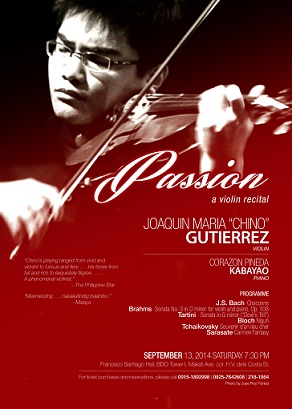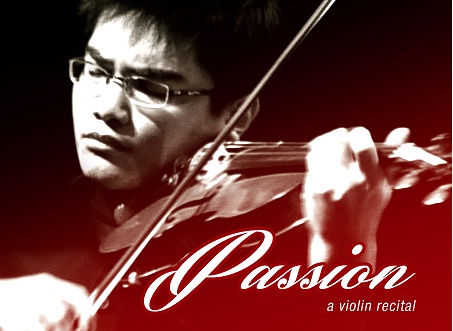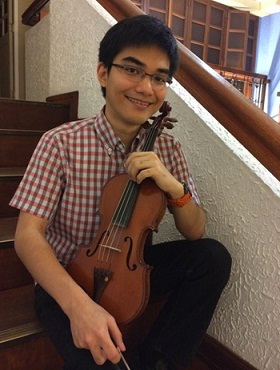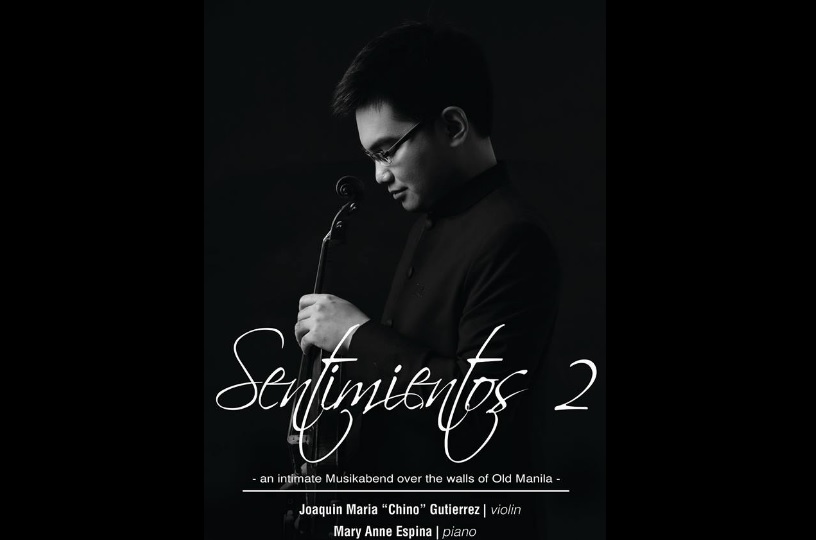By ITCHIE CRUZ-YAP
Many young Filipino musicians struggle to make their music heard. Although the Filipinos are a very musical lot, the infrastructure for music and the arts in the Philippines is still fraught with a lot of challenges. To make a name here, often one has to first make it big elsewhere.
But this is not how violin virtuoso Joaquin Maria Fernando “Chino” Gutierrez sees his musical career predicament. It is not just to make a name for himself that he goes abroad. For him, going overseas is just a way to learn from the masters the world over. Ultimately, to come home more experienced so as to contribute in enriching his country’s musical heritage is his life goal.
On September 13, 7:30 p.m. Gutierrez is holding a concert, “Passion” at the Francisco Santiago Hall, BDO Tower 1, Makati Avenue to raise funds for his studies at the prestigious State Academy of Music and Theater in Munich
Gutierrez was supposed have attended the Keshet Eilon International Summer Violin Mastercourse in Western Galilee, Israel from July 20 to Aug. 7. It was an exclusive training program for excellent string students from all over the world where students are mentored one-on-one by masters also from different parts of the world. Gutierrez was the only Filipino student to have been accepted to this elite course.
But alas, the war in Gaza Strip broke out and many of the participants to the summer Master course backed out. Gutierrez decided to come home to Manila for the summer break.
Talk of blessing in disguise. Those in Metro Manila will have an opportunity to watch and listen to him on Sept. 13 before he goes back to Munich.
Gutierrez advises everybody to come on time to be able to enjoy the program it in its entirety. He will be opening with J.S. Bach’s Chaconne.
A work for solo violin, Gutierrez said, “The Chaconne is hard to rival in its beauty, intensity and emotionality.”
Gutierrez said, “Some have even suggested that Bach wrote the Chaconne as an expression of the Holy Trinity, with the three sections each representing one aspect of God. Whatever the case, the Chaconne definitely remains an incomparable achievement: Bach packed into the violin, a one-handed instrument, all the richness of sound normally attainable on a two-handed instrument such as the organ or piano. This enormity of sound, coupled with its breadth of emotion, make the Bach Chaconne one of the most technically difficult and musically demanding – and satisfying – pieces in the violin repertoire.”
 Gutierrez will also be playing Giuseppe Tartini’s “Devil’s Trill”, which he said is a “fiendishly difficult although deceptively simple piece.”
Gutierrez will also be playing Giuseppe Tartini’s “Devil’s Trill”, which he said is a “fiendishly difficult although deceptively simple piece.”
He related the story that Tartini was visited in a dream by the devil, who then played him a sonata of such unearthly beauty and imagination that Tartini immediately wrote it down upon waking up. “The resulting ‘Devil’s Trill’, peppered with chords, daunting finger-stretches, and the blisteringly fast trills that give the work its name, was described by Tartini as ‘the best music I ever wrote’. Its combination of haunting lyricism and technical challenges has kept it a popular favorite until today,” Gutierrez enthused.
A musical prodigy, Gutierrez’s interest in violin began when he was seven years old, an age that may not be considered by some as being too early to be deemed prodigious. However, the young boy’s attraction to the instrument was such an insurmountable force that his mother eventually gave in to his incessant pleading to get him one. Gutierrez’s progress with the violin was phenomenal! It is as if he was born with the fiddle on hand.
At 24, Gutierrez has become a genius at violin. Violin masters like Gilopez Kabayao hail his impeccable performances.
Although his parents are not musical geniuses themselves, Gutierrez has come from a line that has, in the past, produced a violin master.Chino said his Great Grand Uncle on his mother’s side is Ernesto Vallejo, the country’s foremost violinist during the pre-war era. Gutierrez recalls the story of Vallejo’s tragic end being narrated, how his Japanese captors had Vallejo play the violin one last time before he was beheaded. This story has left a mark on the young Gutierrez.
Gutierrez wants to be able to do something for his countrymen. He wants to bring music closer to the masses. He envisions a day in the future where there would be what he calls the ‘democratization of music,’ where even the poor but deserving young musicians will get a chance to experience music and hone their skills.
He cites El Sistema, a “movement started in Venezuela from the vision of Maestro Jose Antonio Abreu” which goal is “to fight poverty and promote community development and social change through music.” It was said that in 1975, Abreu told a group of 11 young musicians that “with their instruments they would change the world.”
Chino shares that dream for the Philippines.


